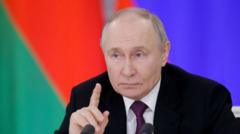Vladimir Putin has indicated a willingness to consider a cessation of hostilities in Ukraine, but his statement is laden with conditions and intricacies that threaten the prospects for a meaningful ceasefire. Speaking ahead of discussions with US representatives at the Kremlin, Putin acknowledged the idea of pausing military actions but swiftly pivoted to elaborate on the expectations he holds, which have surfaced consistently during Russia's ongoing invasion.
“We agree with the proposals to cease hostilities,” Putin remarked, emphasizing a desire for a resolution that fosters long-term peace and addresses the underlying issues fueling the conflict. While the universal need for lasting peace is recognized, Putin’s interpretation of these core issues heavily leans towards undermining Ukraine's ambition for sovereignty and its aspirations to become a member of NATO and the European Union—goals deeply embedded in Ukraine's constitution.
Despite any positive tones in his remarks, significant hurdles stand in the way of realization. Key demands include a halt to Western military support for Ukraine and mechanisms to ensure strict adherence to these stipulations—requests viewed as unacceptable by Kyiv and its Western allies. From the outset, Putin has insisted on the “demilitarization” of Ukraine, a stance that directly contradicts the efforts of the Ukrainian state and its supporters.
The Kremlin is stubbornly maintaining its tactical advantage on the battlefield, particularly in the Kursk region, which has experienced partial occupation since last summer. Putin's remarks suggest he feels emboldened by recent military developments and doubts the necessity for a ceasefire, stressing that such a pause would only allow Ukrainian forces to reorganize and rearm.
Rhetorically questioning, “If we stop military actions for 30 days, what does that mean?” he voiced concern about the potential for Ukrainian reinforcements during a truce—an assertion that runs counter to the stalemate most of the front lines currently experience. Overall, Putin's reluctance to agree to a ceasefire stems from an acute awareness that doing so could jeopardize Russia’s strategic position.
While Putin has invited dialogue with American interlocutors, critically, he seems to be laying the groundwork for negotiations reflecting his conditions. Reflecting a level of skepticism regarding the benefits of a ceasefire, particularly while feeling bolstered on the battlefield, the Russian leader is poised to pursue a path rife with challenges for any potential negotiations. Ultimately, any breakthrough will likely require a significant shift in dynamics, underscoring the complexities of reaching a resolution in this ongoing conflict.




















